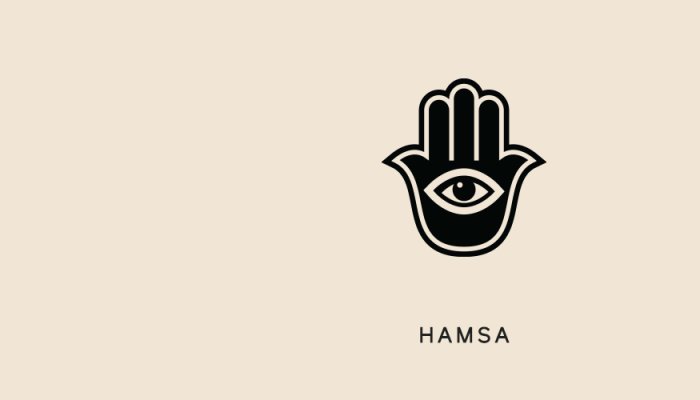Hamsa Meaning: History + How To Use It, According To Experts

The hamsa, also sometimes referred to as the Hand of Fatima or the Eye of Miriam, is a symbol of a hand with an eye in the center. The hamsa relates to the belief in the evil eye, with the hamsa itself offering protection from the evil eye.
It’s been connected to a number of traditions for centuries, and remains a popular symbol for warding off negativity today. As assistant professor of religious studies at the University of Denver, Dheepa Sundaram, Ph.D., tells mindbodygreen, it has connections to Islam, Judaism, Hinduism, and Buddhism.
“Within Islam and Judaism, it’s about warding off the evil eye—the idea of the protector,” Sundarama explains, adding, “In Hinduism, it’s often used as a synonym for the supreme spirit or the ultimate reality, which is called ‘Brahman,’ as well as a vehicle for knowledge. In Buddhism it represents the universal spirit and being released from the cycle of rebirth, or samsara.”
And FYI, if you’re unfamiliar, the concept of the evil eye is thousands of years old, too, and is based on the idea that someone can put a spell or curse on you with just ill will or a dirty look alone. Many countries and cultures believe in the evil eye. Psychology expert and owner of Psychic Medium Witch, Leigh Ann Romano Rogers, M.A., tells mindbodygreen, “Belief in the evil eye is a cross-cultural phenomenon found throughout Europe, the ancient Egyptians, North and East Africa, the Middle East, the Philippines, and Latin America, among other cultures.”
In the hamsa symbol, the evil eye is incorporated into the hand, “whose five fingers symbolize the five pillars of Islam or simply the fingers of the hand in Jewish tradition,” explains shamanic healer, spiritual teacher, and adjunct professor at California State University-San Bernardino, Jonathan Jay Dubois Ph.D.
